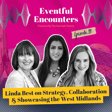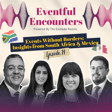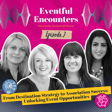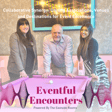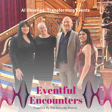Become a Creator today!Start creating today - Share your story with the world!
Start for free
00:00:00
00:00:01

Eliminating Risk in the Event Industry
Following an incredibly popular session at the ABPCO Festival of Learning, Leanne and Tanita chat to Emma Robson from Alzheimers Research UK, Lee Morgan-Jones from James Hallam and Adam Baggs from Soaring Worldwide. This month's podcast covers the different risks inherent in events and ways to mitigate them.
Transcript
Introduction to 'Eventful Encounters'
00:00:00
Speaker
Hello and welcome back to Eventful Encounters, powered by the Eastside Rooms, the podcast where we delve into the fascinating world of events, planning and management. I'm the marketing manager here at the Eastside Rooms. And I'm Leanne, the director of sales and marketing at the Eastside Rooms. And they laughed. Oh, yeah, I got that one. Just half of the business. Same.
Revisiting Risk Management Panel Experience
00:00:21
Speaker
We are planning on rebuilding a session that we all recently worked on together at the Festival of Learning, which was run by Abco up at the SEC in Glasgow at the end of last month, which seems to have flown by.
00:00:38
Speaker
So as part of the Festival of Learning, Emma, Lee and myself and Adam were all part of a panel on risk and we all felt that we had lots to discuss and actually that our session just wasn't long enough so we thought let's revisit it here on the
Introduction of Guests
00:00:54
Speaker
podcast. So I'll pass over to Tina who's going to introduce all of our guests. That's right Leanne, we've got three incredible guests with us today. So first off we have Emma Robson from Alzheimer's BC at UK.
00:01:06
Speaker
Then we have Lee Morgan Jones from James Hallen Shorts Brokers. And can we call you a regular guest now? Adam Banks from Soromoye. I guess so, yeah, my second visit. So yeah, go for it.
00:01:19
Speaker
So we wanted to kind of talk about the importance of discussing risk management within the events industry. And I think that when we started prepping for our panel at Abco, we all kind of had moments where we thought, oh my gosh, this could actually happen. And it has happened, in fact, when Emma and Lee have been planning or working on events in the past.
Emma's Experience with Risk Management
00:01:40
Speaker
So we wanted to hand over to you first of all Emma so that you could share your story on how you've dealt with risk as part of your current role.
00:01:49
Speaker
Thanks, Leanne. Yeah, so thanks for having me. I've worked in the events industry for quite a long time. I've been at Alzheimer's Research UK for eight years now. And we've got lots of different events that we organise for our donors and supporters. As you can imagine, lots of those include various different types of risks. So I think the example that I talked about at the Festival of Learning was all around a walk. So we've got a walking product called Walk for Cure.
00:02:19
Speaker
where people can come they might have symptoms of dementia and so lots of risk around vulnerable people attending that event and taking part and we needed to put a risk management policy in place because shockingly enough we didn't have one until last year where we piloted those events.
Lee's Crime Scene Event Story
00:02:37
Speaker
So that was something that I led on with colleagues in the organisation and we set that up so that we were covered. Lee will be pleased to know we had insurance also for that event, importantly. Thanks Emma. Lee, yours was quite interesting as well. Can we hear a little bit about what your explanation was?
00:02:58
Speaker
Yeah, so my one obviously had a bit of an insurance spin to it, as you'd expect, really, but I've been in insurance a long time and especially dealing with events for a long time. So you see quite a varied selection of scenarios, but the one that
00:03:13
Speaker
that I spoke about at the Festival of Learning was essentially an event organiser on day one turned up at the venue to find a crime scene that had evolved overnight and they couldn't get access to the venue so they were prevented from getting into the venue by the police and yeah it was a sort of a
00:03:35
Speaker
an ongoing investigation so there was no end in sight and the forensic team weren't there yet so it was a long delay and a bit of a mad scramble for the event organiser to arrange something alternative which thankfully the insurance helped with.
00:03:54
Speaker
That's the outline scenario is that, yeah, they could
Adam's PR Crisis Management
00:03:57
Speaker
get in. That was the main thing and insurance and a good plan did sort of save the day on that one. But, you know, it was it was obviously definitely a curveball for a very prepared event organizer at that time. I can imagine that was a pain. Yeah, worst case scenario. And then, Adam, can you share your story about risk as well, which also were, you know, was a bit amazing.
00:04:24
Speaker
Mine was more comms related, which is what my role entails primarily, but still within the event world, surrounding a charitable organization. You know what it's like. Volunteers get together, they're working on something similar. Someone says, let's set up WhatsApp groups so we can chat, keep ideas going. The WhatsApp groups grow. They're not official. They're just
00:04:47
Speaker
a bunch of people. And then unbeknownst to us at some point as people involved at the senior level on the charity, someone posted a particularly unpleasant comment in there. I won't say what it was, but it was foul.
00:05:02
Speaker
And then the first we knew about it was the call I got from one of the national newspapers, asking us if we could provide a comment on this issue. It got further and further. There was a politician involved. There was all sorts of stuff going on. But fundamentally, because it was a political figure a couple of days before an election, it was, you know, the national metabolites loved.
Building Trust as a New Venue
00:05:26
Speaker
This is a great story. And they were going after it and we were just dragged into it.
00:05:30
Speaker
purely because it was a group of volunteers involved in the charity. So it all became about how we managed that situation, how we dealt with firstly, going back to the national press and creating appropriate content around that, but also how we dealt with the individual involved and how we also dealt with our stakeholders, because some of them were effectively, for want of a better word, victims of the comment that was made. So it was quite a challenging process and one that took some
00:05:59
Speaker
took some time and some head scratching to make sure we approached correctly. I can imagine that was a difficult one to deal with. And last but definitely not least, Leanne, can you share your story? Yeah, absolutely. So
00:06:13
Speaker
We are still a relatively new venue at the Eastside Room. So we opened back in 2021, my famous line, but in the middle of the global pandemic. So we opened under quite difficult circumstances. And we've had a few scenarios now where actually we've had clients that have
00:06:32
Speaker
you know, are wanting to place inquiries and bookings with us but because of the size of our venue and the level of inquiries that we're getting, now quite often they're having to book multi-year deals with us when actually they haven't even had their first event with us and because we are a new venue, they haven't had that
00:06:53
Speaker
historical experience of the venue. You know, they haven't attended events at our venue before, and they don't know a lot about us. So in my circumstance and situation, it was where
Key Components of Risk Management
00:07:05
Speaker
a client was kind of looking to book two events, contract two events, but I hadn't actually even had one yet. So how we kind of overcame that together. Perfect. Thank you very much.
00:07:18
Speaker
So, following on from the Abco Festival of Learning, obviously we all discussed ways of kind of sharing best practice. And I think even when we were kind of doing our prep for the Festival of Learning as well, we kind of discussed, you know, how important it was to make sure that we kind of look to mitigate risk, but obviously it is inevitable in certain situations. I think Lee's scenario definitely put the heebie-jeebies up as all. So I think it'd just be good for us to kind of discuss ways that we've
00:07:48
Speaker
you know, what we've learnt from those events, I suppose, and, you know, just
00:07:54
Speaker
making the organizers understand what they could do to kind of prevent them or if they overcome them to share some best practice. So if I hand over to you, Emma, first of all, because obviously yours is an event that you've run yourself. And actually, I didn't even think about the risks that we're involved in. It's kind of like running two events simultaneously. So maybe if you can discuss that and just let us know what you've kind of learned from it and how you can share best practice, that'd be great.
00:08:21
Speaker
Yeah, sure. So I think, firstly, you know, we have a process in place. So every event that we organise, we put a risk register together when we're in the planning stages for those kind of big risks that might come up.
00:08:33
Speaker
But then operationally, we also have an operational risk assessment from the day. So for this event, we're working with a third party provider to provide the walk. So again, making sure we have those conversations up front that they can provide us with their risk management approach, that we can work together on that and we know how to then do it. And then for walk for cure, like I mentioned, we implemented a risk
00:08:56
Speaker
management policy so that it was actually a bit bigger than just having that operational risk assessment. It was, you know, what would happen, how would you involve the comms team, how would you involve, you know, if the worst were to happen, what would that cascade of information be and how would we implement it on event day, which is often a weekend, you know, not everyone's at work. So I think there were already some policies in place, but it didn't cover event specifics.
Implementing Risk Management Policies
00:09:23
Speaker
And I think when we've got junior people in the team running these events, they need to be able to cope with those risks. Did you want to say something, Adam? It was just, I was just fascinated. I guess for you it must be so important having the right people there though, because I mean, there's a lot of risks you can plan for and I bet Lee's got some fantastic examples of this.
00:09:46
Speaker
But let's face it, the ones that are the real nightmare, the ones you don't see coming, like as he said, how important are your people there? Am I dealing with that?
00:09:56
Speaker
Yeah, the people are so important. So we, you know, implemented a really strong briefing system so that everyone had the information that they needed. But importantly, they knew really easily what to do should something happen. So it was a quick, you know, you flag it with these people. If you can't get hold of these people, this is the backup. And that was kind of the simplest way to do it so that
00:10:16
Speaker
You know if anyone found out about something they would keep it contained within the event delivery team and and our third-party providers say that We could then respond and react in the right way instead of you know if the worst were to happen We didn't want to cause any panic We didn't want people to go to the press if you know if it wasn't appropriate However, that would be it all needed to be managed appropriately. I mean this was all hypothetical as well We were planning it
00:10:40
Speaker
in the hope that nothing did go wrong and thankfully Touchwood nothing did happen in the pilot series but obviously it could as Lee will tell us about his various experiences but to think through that process it's better to do it before something goes wrong than to have to then implement those processes afterwards. I guess it's quite, sorry.
00:11:02
Speaker
I guess it's quite difficult to kind of preempt what could go wrong before something's actually gone wrong as well and trying to think through every possible scenario. Yeah I don't think you can ever think through every possible scenario but I think you can get an idea of those kind of risk categories so we work on that kind of risk matrix which
00:11:20
Speaker
I think lots of people will be familiar with. So yeah, critical incident, serious incident, and then going down through the scale. So yeah, you can't plan for everything. But at least if you've got a rough idea of how to approach those categories, then you know how to start dealing with it at least.
Importance of a Major Incident Plan
00:11:43
Speaker
Fabulous.
00:11:44
Speaker
Thanks for that, Emma. So, Lee, over to you. If you can share some best practice, you know, from your scenario and kind of key learnings for people to take away. Yeah, I mean, as Emma said, really, a lot of my themes will resonate through that. So, you know, have a plan and a written plan to save so much time and resource when the sticky stuff hits the fan, if you know what I mean. So, if you
00:12:08
Speaker
you sort of have a written major incident plan. It covers a whole gamut of risks and scenarios that could pop into play. So you might not have a specific item in your list, but as long as it ticks overload that parameter, then you'll be fine. So things to consider is many risks will roll over from event to event, but some will be site specific and location specific. So
00:12:36
Speaker
from that, when you're sort of considering the risks and carrying out your risk assessments, make sure you write them down because if they're not written down, it didn't happen. So that's another key. I'll probably keep repeating myself throughout this, write it down. When mayhem is happening, the temptation is to
00:12:57
Speaker
scatter gun magpie really so yeah if you've got a written plan it takes the pressure off so much and you know that you've got the right resource doing the right thing and the key is communication in a lot of these things so you know
00:13:13
Speaker
Once you've categorised the risks, you can then decide which risks your client or you are comfortable with retaining and those that you want to transfer by means of insurance or whatever scenario you've got in place. And then you can also remember that not all incidents are insurable. So you've got to be able to manage those as well.
00:13:38
Speaker
And also that not all insurance policies are created equal. So get some advice or read through the triggers and exclusions and read through the small thing. Make sure it works as planned and ask for some help.
00:13:54
Speaker
myself and my colleagues in the wider industry are there for. I mean it's our day job so be there to help and I'm certainly myself and anyone out there generally in the industry will welcome those conversations from clients because it just proves that the thought process is going on and risk management is key and that's a part of being a good event organizer.
Managing Communication Post-Incident
00:14:17
Speaker
taking it from there. But yeah, having those plans and doing those risk assessments are sort of a written plan is well worth that investment in time, because it just, it takes the edge right off when something goes wrong. Fabulous. So over to you, Adam. Thanks very much, Lynne. I suppose mine's an intro because mine's obviously focused quite a lot on the reputational stuff, which can be what comes next and that, you know,
00:14:43
Speaker
Hopefully, from my point of view, Emma and her friends will be around to immediately sort out the immediate problems and fix the challenge and that kind of thing. And Lee's there to offer the backup. But so often for me, it's that what happens next. It's how it gets reported in the media. It's where things go next. And I tend to start from the point of view of kind of thinking about audiences and segmenting down the audiences. Who matters in terms of, you've got the people on site, you've got
00:15:12
Speaker
stakeholders and event owners, you've got if it's a large organization, you might have the rest of the team, you've then got the general organization's reputation and their products or services, whatever they may be. And by starting to look at almost all those different stakeholders, you can start to think about what's going to be impacted and how it might be impacted by a certain situation.
00:15:37
Speaker
actually then you know the message and and and what you craft from that and whether you're dealing with the media and who you're dealing with it's actually it's not secondary but it's almost secondary in a way is to first of all understanding who you need to communicate with and what you need to communicate to them and some of that is then going back to you know how are we going to deal with this what's the
00:15:58
Speaker
When I say story, because story can soft and sound negative, because story sounds fictional, but it's not that it's, you know, what's the narrative we're going to use and what, how are we going to explain these are the steps we've taken. We acknowledge mistakes were made. We know this happened. This happened and beyond our control. However, these are the things we've done to go forward, to change things. Yeah. Some situations are unavoidable. Some situations are, you know, the one I described,
00:16:28
Speaker
Yeah, some people said someone said to me when we talked about this abco, I can't imagine having a WhatsApp group full of volunteers with no control. He said that to me probably has within their organization, WhatsApp groups of volunteers, they're just not in them. Yeah, a group of employees or what are going to create a group, you know, you just don't know. So sometimes it is that kind of that what comes next type thing and then thinking about what
00:16:57
Speaker
what messages can we put out there? How can we say to people, this is how you, in that example, you communicate on those and those sort of things and those other things. But it's all I think about, as I say, coming back to that, who's the audience deciding what messages you need to get out to them and then putting them out there in as clear a form as possible. Sometimes there's a legal way of saying things that have to be said in certain ways. And that's often,
00:17:26
Speaker
that can be necessary and absolutely what you have to put out.
Challenges in Hybrid and Virtual Events
00:17:29
Speaker
But if you don't have to put that out, then keeping the language simple is so, so important and just getting cutting right through to the heart of things is so important. Absolutely. I think sometimes it's just as important to think about the aftermath and how we deal with it rather than just the risk at the time. I think that's kind of where we've summarized that.
00:17:49
Speaker
So I think going on to my example of what I kind of used, I think for me as a venue, you know, it's all about open dialogue and building trust with the client. So obviously I put myself in the client's shoes and kind of understood that
00:18:09
Speaker
you know, to contract two years worth of events having not even had an event in the venue. You know, they're putting a lot of trust into us without having any experience of using us. So I think what was really important for me was just to kind of maintain the open dialogue and to put clauses in our contract that both the client felt comfortable with and we as a venue felt comfortable with.
00:18:33
Speaker
which were all based around service delivery of that first event before the second event then took place. But it was a real-life scenario, you know, so this was actually an event that happened last year and at the beginning of this year. And I think it was just a case of kind of building trust with that client
00:18:51
Speaker
making sure that, you know, it's as important for us that their event is as a success as it is to them. You know, we want their event to be successful. We want to have that repeat business too. And actually, I think because we built that trust up from the beginning and we were confident in our venue and our product and what we were going to offer to them, when it then came to
00:19:13
Speaker
contracting future events, which they've now done with us. We don't have to put those clauses in because they trust us. But you know, it was all about kind of building that trust and.
00:19:24
Speaker
Getting them to understand, I suppose, how we work as a venue and what we want to deliver. So for me, if it's a client that's kind of looking to place business within a venue, I would just say, keep the dialogue open with that venue that you're looking to contract with. Make sure that you are happy with the terms that you're contracting with and that you have in your contract.
00:19:46
Speaker
what you want, you know, what you're setting out, not just from monetary values, but also service as well. And if it's a venue that's set to deliver, they'll be happy to do that, you know, and happy to work on the contracts with you. So it's all about open and honest dialogue.
00:20:03
Speaker
So, just to kind of summarise what we've... Oh, Adam, did you want to ask me something? No, sorry, no, actually, it was a question for Emma, actually. It leads on from something you were saying. I'm just intrigued to know, with the development of so much more hybrid, so much more online, how that's impacted risk. Because it's really
00:20:25
Speaker
easy to identify us, not easy to identify and see, but I can see where a whole load of things go wrong when you get a bunch of people in a physical environment. But dealing with risk around this, and I was just thinking, it occurred to me because halfway through whilst I was speaking a minute ago, the dog came wandering in.
00:20:41
Speaker
through the door. You didn't see it, but it could have been the someone knocking on the door. And when a keynote that happens to all those kinds of things or significant other things because you can't control someone's home environment or someone's remote work environment.
Technical Preparedness in Events
00:21:00
Speaker
You don't know what their health and safety is. How are you dealing with that?
00:21:04
Speaker
I think we've become quite used to, you know, adapting and using platforms where they can blur their backgrounds or, but yeah, I mean, someone not turning up is a real risk, you know, they don't get the link or they don't, they can't do the tech. So again, to mitigate that, we would put in test calls, briefings, you know, this is how we would do it, send them a bit of a cheat sheet in terms of
00:21:28
Speaker
These are the kind of things that work well on screen or don't work well on screen. And the team has become quite experienced at that. Just thinking our annual conference is a prime example where we would have speakers dialing in sometimes internationally. So we're really clear on time zones and all of that kind of information. It's about, I think, briefing them really well.
00:21:49
Speaker
and knowing what they've signed up to do you know we're inviting them to speak at a conference they know that they commit to doing that and having that kind of relationship building so I think it goes back to what Leanne said you're exactly right that it's all about relationships and building that rapport so yeah not just with your venue but with your speakers and delegates as well I think it's really important yeah there's so much more to even think about with virtual and hybrid events so much more
00:22:16
Speaker
Time difference, I didn't even think about that. I know, yeah. I think the most recent one was just not having the right tech in the venue as well.
Summary and Key Takeaways
00:22:28
Speaker
So, you know, having to then reach out to suppliers last minute to get the right tech so that we could produce something at better quality than what was already there. So again, those conversations with the venue are really important around what the facilities are and what they can do.
00:22:45
Speaker
and always having someone with a technical mind having that conversation, because they might say to me, you know, this will do what you need it to do. And I'm like, yeah, brilliant. And then you get there and you're like, hang on a minute. It doesn't. So, yeah, having people that can have those conversations is really helpful. And thankfully, my team do know their stuff more than me. It's always good to have.
00:23:07
Speaker
So just to kind of summarize key points that we've discussed so far. So Emma, your advice was definitely planning is key, make sure you get those risk assessments done, and also, you know, briefing the team so that they all understand what their roles are within the event, within the event, and also, you know, what to do if anything does crop up and what the steps are. So that was really good advice. Yours was, you know, make sure that you've got a plan
00:23:36
Speaker
a major incident plan, you actually called it. And that communication is key, you know, make sure that you've got it written down. And I think you were really kind of open and fair when you said, you know, make sure that if you do have insurance for your event, that it covers what you need it to, and that you've read all the kind of small print in there to make sure that you are properly covered. And you also talked about, you know, some risks are specific to a site and some risks are specific to
00:24:05
Speaker
a location as well so just kind of bear that all in mind and you kind of touched on you know how reputation is so important you need to look at what the narrative is always look at what's happening next and think of the audience and you know who is it that matters and what is the message that you're trying to get out there.
00:24:25
Speaker
So I think we've given people some great takeaways, but now if you could think of kind of one important takeaway that you would give our audience, what would it be? So let's start with you this time, Adam.
00:24:41
Speaker
Wow. Just a quick on the spot there. Yeah. Yeah. I was thinking about ages here. Brilliant. I can listen to the others. It does mean that someone else can't steal mine and they don't have that moment at the end going, Oh yeah. I was going to say what Lou said. Communication has got to be what it comes down to effective communication.
00:25:00
Speaker
Whether it's with your insurer, your venue, the organiser, whoever's involved, the AV company, that communication is ultimately what's going to put you in the best position to mitigate any forms of risk in my opinion. Lee.
00:25:15
Speaker
Mine was obviously going to be communication, but it's a written plan. It's just well worth the investment in time, but it brings all things together. So it brings in the risk assessment, it brings in people, it brings in everything into that major incident plan and having it written down and so that everyone in your team is aware it's there as well.
00:25:37
Speaker
because you don't want someone who sees something not knowing that this plan exists. So, you know, communication again, leading into Adam's, that's leading Adam's thunder is just, yeah, it's just key. I don't really have anything else to add on that. I think you both said what I was thinking, you know, is that don't do it in isolation, you know, it's great having the plan, but you need to share it. So it's
00:26:08
Speaker
Well, I was going to funnily say, communication. I think communication is key, open dialogue, definitely. But for me as a venue, I find as well, it's kind of really important to understand what's most important to the client. So, you know, when they're having their event, all different events run differently, and people always have different priorities. So for me, it's understanding
00:26:23
Speaker
Yeah, planning and communication. I'm going to have both of them. That's fine. That's fantastic advice.
00:26:33
Speaker
each conference is different, each event that comes into the venue is different and what are the priorities for that client? What does it take to make their event successful? And how can we work through that together? So there's communication and around that. I think you've all tied it up to be kind of the same, but different from your own angles, which is really nice to hear. So that's fantastic advice. And if we can thank you all for joining us today, it's great. And you've shared your experiences and that's been great.
Closing and Next Episode Announcement
00:26:59
Speaker
Fabulous. So our next episode will be out in June. So stay tuned, see what that will be about. As always, if you've enjoyed this episode, please subscribe, comment and share. And to stay up to date with all things eventful encounters and these side rooms, follow us on Instagram, Facebook and LinkedIn. Thanks very much. Thanks, bye.
